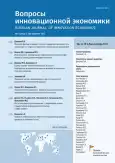Инструменты стимулирования открытых инноваций для городских пространств
- Авторы: Мухаметов Д.Р.1
-
Учреждения:
- Финансовый университет при Правительстве Российской Федерации
- Выпуск: Том 13, № 3 (2023)
- Страницы: 1327-1338
- Раздел: Статьи
- URL: https://journals.eco-vector.com/2222-0372/article/view/608077
- DOI: https://doi.org/10.18334/vinec.13.3.119236
- ID: 608077
Цитировать
Полный текст
Аннотация
В статье рассматриваются инструменты стимулирования открытых инноваций для городских пространств. Открытые инновации – процесс создания новых продуктов и решений через вовлечение различных заинтересованных сторон. Для городских пространств открытые инновации позволяют сократить асимметрию между предлагаемыми технологиями и интересами горожан и других агентов городской политики. В статье рассматриваются такие инструменты стимулирования открытых инноваций, как живые лаборатории, регуляторные песочницы, гостех-акселераторы, фреймворки для организационных реформ. Автор на примерах городской политики выделяет следующие преимущества данных инструментов: доступ к капиталу/инвестициям, базы данных, пилотные площадки и среда тестирования разработок, экспертная оценка, перспективы масштабирования и коммерциализации. Статья представляет интерес для исследователей «умных городов» и цифровой городской среды
Об авторах
Данияр Рустямович Мухаметов
Финансовый университет при Правительстве Российской Федерации
Автор, ответственный за переписку.
Email: mukhametovdaniyar@gmail.com
научный сотрудник Института гуманитарных технологий и социального инжиниринга, преподаватель Департамента политологии
Список литературы
- 1. Luan X.Y., Wang X.H. Open innovation, enterprise value and the mediating effect of ESG // Business Process Management Journal. – 2023. – № 2. – p. 489-504.
- 2. Di Simone L., Petracci B., Piva M. Economic sustainability, innovation, and the ESG factors: An empirical investigation // Sustainability. – 2022. – № 4. – p. 2270.
- 3. Борисюк Н.К., Смотрина О.С. Развитие потенциала промышленной экосистемы региона // Креативная экономика. – 2023. – № 9.
- 4. Яшин С.Н., Яшина Н.И., Захарова Ю.В., Оранова М.В. Реализация концепции открытых инноваций в регионах на базе платформенного подхода // Креативная экономика. – 2020. – № 11. – c. 2803-2810.
- 5. Удальцова Н.Л. Потенциал модели открытых инноваций и его использование // Экономические науки. – 2020. – № 187. – c. 87-93.
- 6. Huggins R., Prokop D., Thompson P. Universities and open innovation: The determinants of network centrality // The Journal of Technology Transfer. – 2020. – № 3. – p. 718-757.
- 7. Mukhametov D. Exploring the Influence of Government Data Performance on Knowledge Capabilities: Towards a Data-Oriented Political Economy // Social Sciences. – 2022. – № 9. – p. 384.
- 8. Тронина И. А., Татенко Г. И., Бахтина С. С. Открытые инновации как форма реализации концепции инновационного развития территории на принципах «умной специализации» // International Journal. – 2019. – № 12. – c. 51-58.
- 9. Mu R., Wang H. A systematic literature review of open innovation in the public sector: Comparing barriers and governance strategies of digital and non-digital open innovation // Public Management Review. – 2022. – № 4. – p. 489-511.
- 10. Мухаметов Д.Р. Создание устойчивых умных городов: технологии вовлечения граждан и совместного экспериментирования // Вопросы инновационной экономики. – 2022. – № 2. – c. 843-858.
- 11. Brown E., Piroska D. Governing fintech and fintech as governance: The regulatory sandbox, riskwashing, and disruptive social classification // New Political Economy. – 2022. – № 1. – p. 19-32.
- 12. Rizzo A., Habibipour A., Ståhlbröst A. Transformative thinking and urban living labs in planning practice: a critical review and ongoing case studies in Europe // European Planning Studies. – 2021. – № 10. – p. 1739-1757.
- 13. Bharosa N. The rise of GovTech: Trojan horse or blessing in disguise? A research agenda // Government Information Quarterly. – 2022. – № 3. – p. 101692.
- 14. Horgan D., Dimitrijević B. Frameworks for citizens participation in planning: From conversational to smart tools // Sustainable Cities and Society. – 2019. – p. 101550.
- 15. Smith M., Nordby P., Yu M., Jaffery J. A practical model for research with learning health systems: Building and implementing effective complex case management // Applied Ergonomics. – 2020. – p. 103023.
- 16. Mukhametov D.R. How ICT-infrastructure Defines Economic Complexity: Information Policy to Facilitate Innovations // System of Signal Synchronization, Generating and Processing in Telecommunications. – 2022. – № 1. – p. 213-217.
Дополнительные файлы











